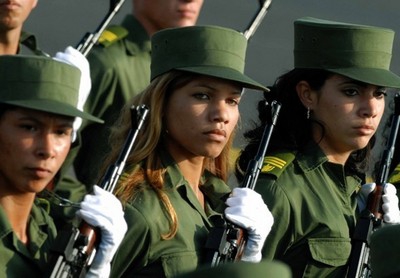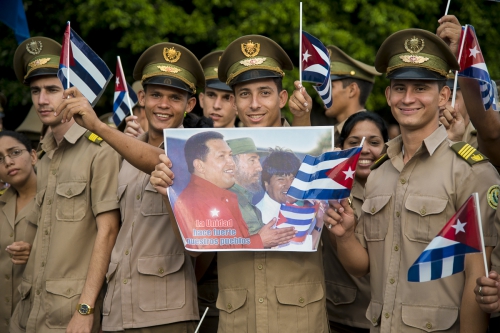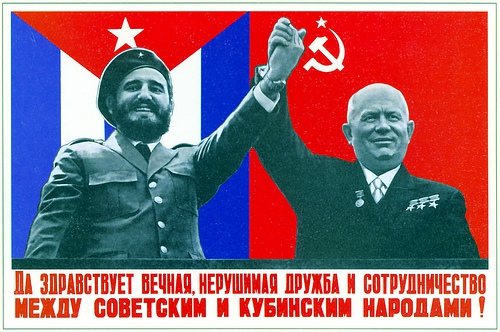The Future of Freedom Foundation
Ex: http://www.lewrockwell.com
During the 1950s and 1960s, the CIA made multiple attempts to assassinate Cuba’s ruler, Fidel Castro. Let’s assume that the CIA had succeeded and that Castro had been shot dead on the streets of Havana.
It’s not difficult to imagine what U.S. national-security state officials would be saying today: “If we hadn’t assassinated Castro, the United States would have fallen to the communists and, today, Fidel and his brother would be running the IRS, Social Security, Medicare, public schooling, and other socialist programs owned and operated by the U.S. government.”
Soon after Castro took power on January 1, 1959, when President Eisenhower was still in office, and continually through the Kennedy administration, the CIA steadfastly maintained that a communist-ruled Cuba was a grave threat to U.S. “national security” — a communist dagger situated 90 miles away from American shores and pointed directly at the United States.
It was all a Cold War farce, one that served as one of the biggest protection rackets in history — one by which the national-security establishment was able to keep the American people in a constant, never-ending state of anxiety, fear, and depression, which assured ever-increasing budgets and power for what Ike called the “military-industrial complex” and what has ultimately become known as the “national-security establishment.”
 How do we know it was all a farce? Because they didn’t succeed in assassinating Castro and yet the United States is still standing! Sure, we’ve got the same types of socialist and interventionist programs that Castro has in Cuba — income taxation, Social Security, Medicare, Medicaid, economic regulations, a Federal Reserve, etc. — but that’s not because Castro conquered the United States but rather because Americans love socialism and interventionism as much as Castro does.
How do we know it was all a farce? Because they didn’t succeed in assassinating Castro and yet the United States is still standing! Sure, we’ve got the same types of socialist and interventionist programs that Castro has in Cuba — income taxation, Social Security, Medicare, Medicaid, economic regulations, a Federal Reserve, etc. — but that’s not because Castro conquered the United States but rather because Americans love socialism and interventionism as much as Castro does.
What difference did it make to the American people that Cuba was ruled by a self-avowed communist? It didn’t make any difference at all. The plain truth is that under Castro, Cuba never initiated any acts of aggression toward the United States. Castro’s own national-security establishment never invaded the United States. It never tried to assassinate U.S. officials. It never initiated acts of terrorism inside the United States.
The only reason that U.S. officials ultimately decided to list Cuba as an official “sponsor of terrorism” was because of Castro’s support of insurgencies in other Latin American countries in which people were trying to oust U.S.-supported right-wing dictatorships, much like the brutal U.S.-supported Fulgencio Batista dictatorship that Castro succeeded in ousting from power in Cuba.
Throughout the Cold War and beyond, the CIA issued severe warnings about the danger that other Latin American countries would end up with communist regimes. It was all a farce too. It wouldn’t have made any difference to the United States if every other Latin American country went communist. That’s because there was never any possibility that Latin American countries were ever going to mount up their military forces and invade, conquer, and occupy the United States.
Consider all the Latin American countries that have gone leftist — including many of the ones that the CIA was so concerned with during the Cold War. Nicaragua, Bolivia, Venezuela, Brazil, Chile, and more. Do you see them mobilizing their armies to invade the United States? It’s a ridiculous notion. And it was a ridiculous notion throughout the Cold War.
That’s not to say, of course, that it’s beneficial for people to live under a socialist or communist regime. That’s where libertarians part company with leftists. Living in Cuba, Venezuela, or other socialist regime is pure misery from an economic standpoint and a civil-liberties standpoint. But the fact is that such regimes never had any interest (or financial means — they were too broke) to even think of invading, conquering, and occupying the United States.
What all too many Americans have still not confronted is what the adoption of the national-security apparatus did to our country — in the name of the anti-communist crusade.
In the post-9/11 era, Americans are now fully accustomed to assassination. Most everyone accepts the fact that the CIA assassinates people with regularity and with impunity and immunity. It’s become a normal part of America’s governmental structure, justified as part of the “war on terrorism,” a war, we are told, is certain to last longer than the Cold War. It’s just another great big protection racket, one designed to maintain the Pentagon, the CIA, the NSA, and the entire national-security apparatus in high cotton for the indefinite future.
The CIA has been an assassination machine practically since its inception. In its 1954 regime-change operation in Guatemala, for example, the CIA had a kill list of Guatemalan officials who were to be assassinated. There were the multiple assassination attempts against Castro. There were the plans to assassinate Rafael Trujillo, the ruler in the Dominican Republic. There was Operation Phoenix in Vietnam. There was the kidnapping-assassination of Gen. Rene Schneider of Chile. There were the assassinations of Americans Charles Horman and Frank Teruggi. There was the CIA’s partnership in Operation Condor, one of the biggest assassination rings in history, one that assassinated former Chilean official Orlando Letelier and his young assistant Ronni Moffitt on the streets of Washington, D.C. And as the mounting circumstantial evidence has inexorably disclosed, there was the assassination of President Kennedy, on grounds of “national security,” as I detail in my book Regime Change: The JFK Assassination.
At one time, CIA assassinations were kept secret or “covert.” That’s because most people recognized assassination for what it was — murder. Even President Lyndon Johnson, who wasn’t exactly the paragon of political virtue, called the CIA’s assassination program a “Murder Inc.”
And that’s precisely what assassination is– murder. What right, either moral or legal, did the U.S. government have to assassinate Fidel Castro or any other leftist ruler? From where did that authority come? It certainly didn’t come with the Constitution, which doesn’t authorize either a CIA, assassination, or regime-change operations. Under what moral, religious, legal, or constitutional authority did the U.S. national-security state murder people because of their political or economic philosophy?
Throughout the Cold War, Americans weren’t supposed to ask those types of questions. They were expected to defer to the national-security establishment. Conscience, reason, and independent thinking were submerged to the judgment of the national-security state. The citizen’s creed became: Assassination is normal and necessary. Our national-security state officials know what’s best. Trust them. Don’t ask questions. Secrecy must be maintained. “National security” is at stake.

The grafting of a national-security apparatus onto America’s founding governmental system was the worst mistake in the history of the United States, for in the name of protecting “national security” from Fidel Castro and communism, it moved America in the direction of the socialist and totalitarian regimes it was opposing.
How ironic that we now live in a society that has adopted the same socialist and interventionist programs found in Cuba and that why we now live in a society in which the government wields the omnipotent power to torture and assassinate its own people and others. How ironic that modern-day Americans celebrate their socialism, interventionism, assassinations, torture, coups, invasions, regime-changes, and their entire welfare-warfare state as “freedom.”
Reprinted with permission from The Future of Freedom Foundation.
The Best of Jacob G. Hornberger




 del.icio.us
del.icio.us
 Digg
Digg
Les commentaires sont fermés.